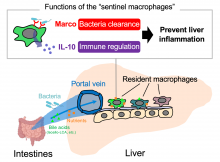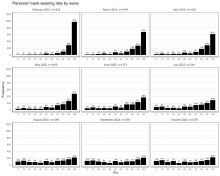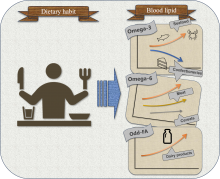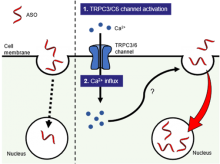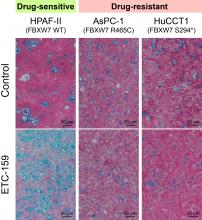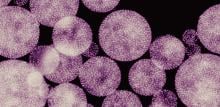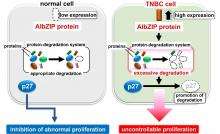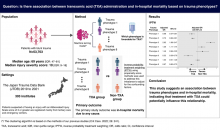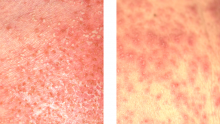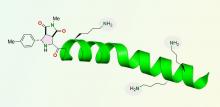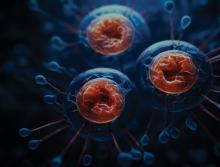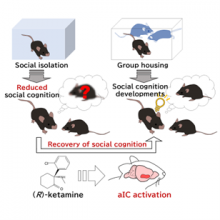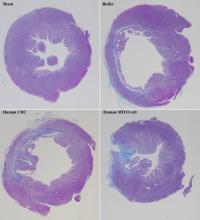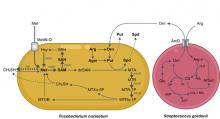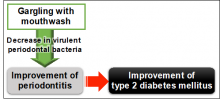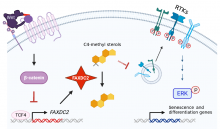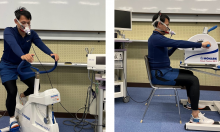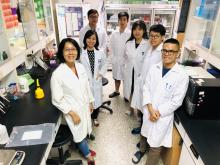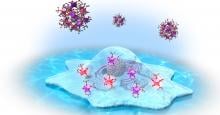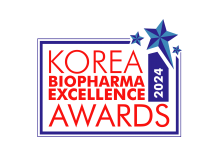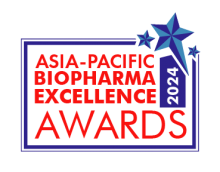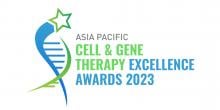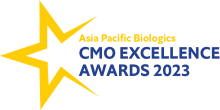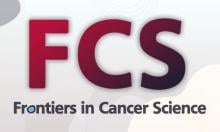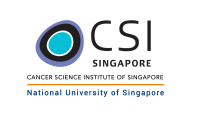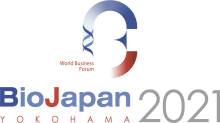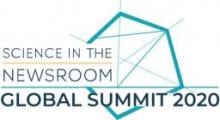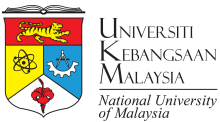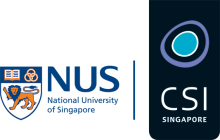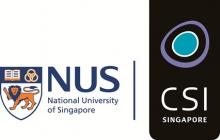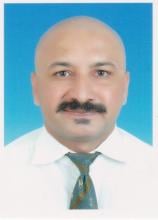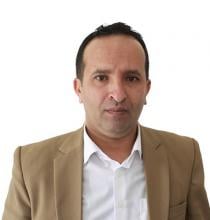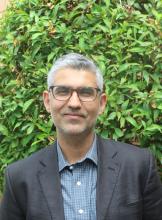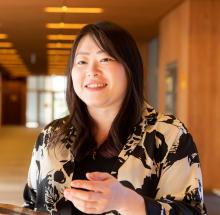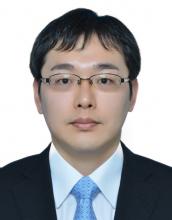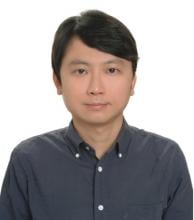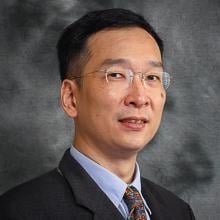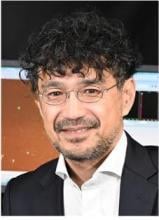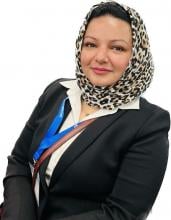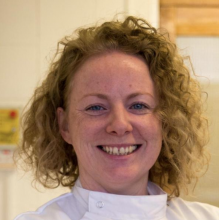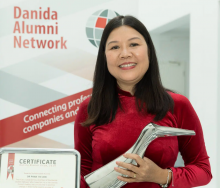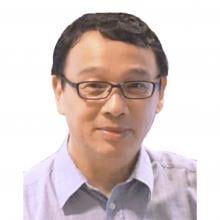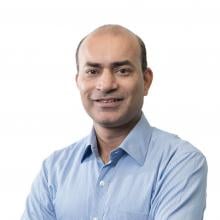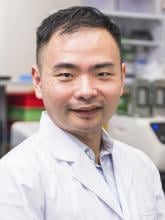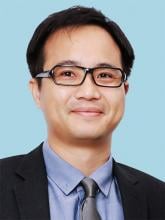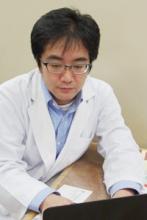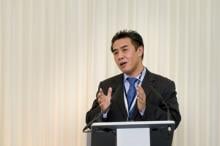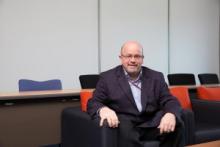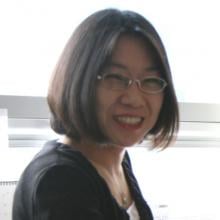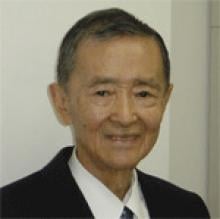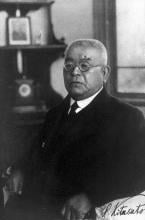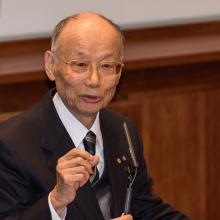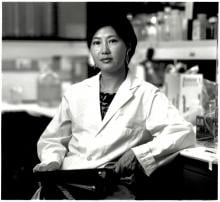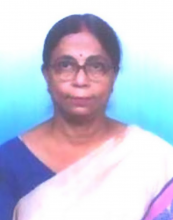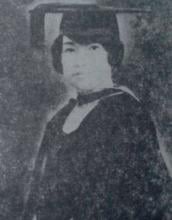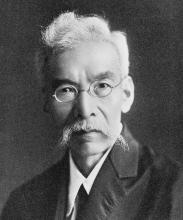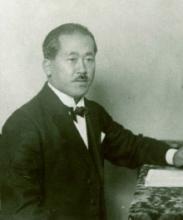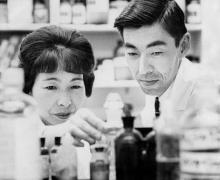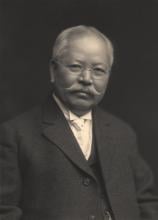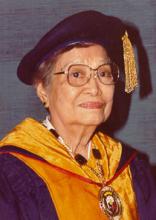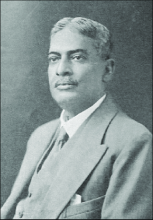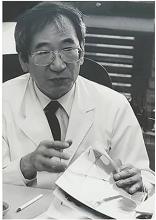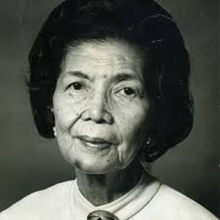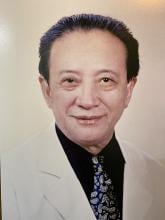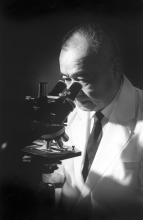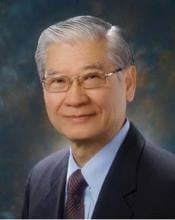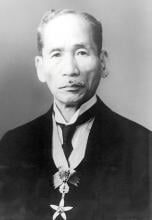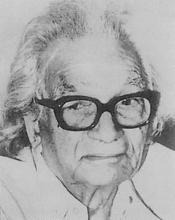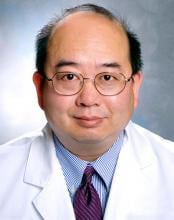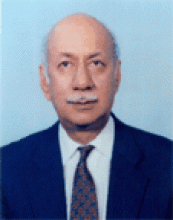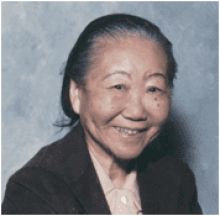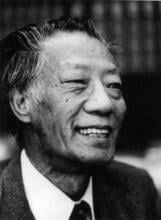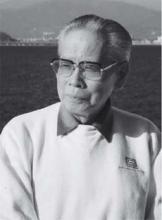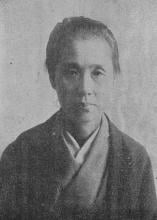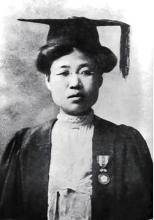Medicine
News
25 Apr 2024
Osaka University researchers discovered liver resident macrophages' pivotal role in defending against gut bacteria and related substances entering via the portal vein, particularly under compromised intestinal barrier conditions. Identified as "sentinel macrophages," they are activated by isoallo-lithocholic acid. This finding holds promise for developing preventive and therapeutic strategies for liver chronic inflammatory diseases, such as metabolic dysfunction-associated steatohepatitis (MASH), by enhancing the function of these macrophages to mitigate inflammation and improve treatment efficacy.
24 Apr 2024
The enzyme PI3K plays a critical role in cell migration. Scientists have long understood this function. But researchers have recently unveiled that a subunit of this enzyme also has the ability to slam on the breaks to this process.
24 Apr 2024
Researchers from Osaka University examined how specific types of contextual changes, such as government recommendations and perceived behavior of others, influenced mask-wearing behavior during the COVID-19 pandemic. They found a complex relationship between societal norms and individual behavior during the pandemic, indicating that future strategies for public health crises interventions should consider various factors and contexts, including cultural predispositions.
15 Apr 2024
A recent study by Tohoku University researchers has shed light on the association between dairy product consumption and odd-number carbon chain fatty acids (odd-FA) within the Japanese population, a correlation previously confirmed in Europe and Oceania but understudied in Asian countries.
15 Apr 2024
Researchers from Osaka University found that a new activator called L687 induces cancer cells to accept delivery of antisense oligonucleotide (ASO) drugs. These drugs can treat cancer by blocking the transfer of messages from genes that encourage cancer growth. Previous methods to deliver ASOs into cells had only limited success. This research will help accelerate the development and delivery of novel ASO cancer therapies.
11 Apr 2024
Duke-NUS study reveals why some pancreatic and colorectal tumours resist targeted anti-Wnt drugs and suggests how to overcome it, offering new hope to patients with fully treatment-resistant cancers
05 Apr 2024
New research could pave the way to develop cancer drugs targeting an enzyme that inhibits ferroptosis, a type of cell death. Cancer cells that are resistant to anticancer drugs are known to be vulnerable to ferroptosis. Therefore, agents that effectively induce or enhance the sensitivity of cancer cells to ferroptosis are expected to become novel anticancer agents.
05 Apr 2024
Rapid, responsive, and readily-available antigen-antibody testing is crucial in the fight against infectious diseases, something driven home by the COVID-19 pandemic. To improve these tests, a Tohoku University research group has created a new method to form polymer particles that are adorned with gold nanoparticles.
25 Mar 2024
May prove to be therapeutic target in breast cancer treatment
25 Mar 2024
Researchers from Osaka University used machine learning to identify subgroups of trauma patients who are more likely to survive their injuries if treated with tranexamic acid. This treatment controls bleeding and thereby prevents death from hemorrhage. The team also identified subgroups of trauma patients who do not benefit from tranexamic acid. These findings should help guide treatment decisions after traumatic injury and provide trauma patients with more personalized care.
15 Mar 2024
Two rare skin conditions with similar symptoms can be mistaken for each other, so a scoring system has been formulated to aid physicians in distinguishing two diseases
14 Mar 2024
Ancient Mars biomolecules, Gargling away bad bacteria, Molecule glasses magnify life-chemical observations, Cholesterol and cancer link, Quantum electronics leap, Plus our updated Experts for Media: Women list & Asia Research News 2024 is here. Read all in the latest Editor's Choice.
11 Mar 2024
Peptides are short strands of amino acids that are increasingly used therapeutically, as biomaterials and as chemical and biological probes. The capacity to isolate, manipulate and label peptides and larger proteins is limited, however, by the ability to reliably attach functional molecules, such as fluorescent compounds, to peptides in locations that won’t affect the three-dimensional structure and function of the short amino acid strand. Researchers have developed a unique chemical reaction to attach two distinct functional molecules to the N-terminus of a peptide in an efficient, robust reaction under mild conditions.
26 Feb 2024
Magnetic nanorobots delivering nerve cells to targeted tissues could potentially be used to repair damaged brain tissue, as well as other organs.
23 Feb 2024
A new technique allows researchers to map how the cellular “skeleton” adapts to external stress.
23 Feb 2024
Researchers from Osaka University have found that, after chronic social isolation, one form of ketamine—(R)-ketamine—is effective for restoring neuronal activation in a brain region known as the anterior insular cortex. This restored activation leads to improvements in social impairments in a mouse model of depression. Together, these findings indicate that (R)-ketamine is a promising treatment for social symptoms of depression and may lead to better quality of life for millions of people worldwide.
21 Feb 2024
Regenerative therapy to treat heart failure is more effective when the mitochondria of the regenerative cells are activated prior to treatment.
19 Feb 2024
In a step forward for breast cancer treatment, researchers at Tohoku University have developed a novel monoclonal antibody which specifically targets a certain type of breast cancer cell.
16 Feb 2024
Researchers at Osaka Metropolitan University assess why post-operative symptoms such as pins and needles, sudden cold, burning, itching, and numbness in the limbs remain in patients suffering from cervical spondylotic myelopathy, even after surgery. The researchers also evaluated the patients’ satisfaction with postoperative treatment. They found that it was lower for those who still had paresthesia in their hands and feet, regardless of whether their motor symptoms had improved or not.
15 Feb 2024
Researchers from Osaka University found that the oral bacterium Streptococcus gordonii activates another bacterial species, Fusobacterium nucleatum, to produce large quantities of methyl mercaptan, a compound responsible for bad breath. Disrupting this interaction could therefore help treat halitosis, and possibly also help prevent the development of more serious tooth and gum disease.
15 Feb 2024
Vaccines and therapies based on messenger RNA could be more readily delivered due to a non-toxic polymer that protects RNA and controls its release inside cells.
14 Feb 2024
Researchers from Osaka University have found that gargling with an antiseptic mouthwash can reduce so-called ‘bad’ bacteria in the mouths of patients with type 2 diabetes. Notably, this reduction in bacteria was accompanied by improved blood-sugar control in some patients. Given that the oral diseases caused by these bacteria have been linked to many other serious inflammation-associated diseases, such as cardiovascular disease and Alzheimer’s disease, this simple treatment may have widespread effects.
08 Feb 2024
A new coating for tiny vaccine carriers allows vaccines to remain in the body for longer.
02 Feb 2024
Asia Research News monitors the latest research news in Asia. Some highlights that caught our attention this week are how exercising to music can help cognitive function, a material inspired by a mythological creature, and choking cancer cells using calcium.
02 Feb 2024
A study led by Duke-NUS Medical School has found an important connection between cancer, stem cells and the building blocks of cholesterol. Specifically, the research reveals how the enzyme FAXDC2 influences cancer cell growth and differentiation through its role in cholesterol synthesis, suggesting possible new approaches to cancer treatment.
30 Jan 2024
A team of researchers from Osaka Metropolitan University assessed the feasibility of conducting cardiopulmonary exercise testing with the upper limbs as an alternative to the conventional method that uses the lower limbs. The researchers investigated the relationship between heart rate and oxygen uptake during exercise stress tests using a cycle ergometer and an arm crank ergometer, and estimated maximal oxygen uptake. The study participants were 17 male collegiate athletes from rowing and cycling clubs. The results showed that the estimated maximal oxygen uptake for both rowing and cycling groups was lower on the arm crank ergometer than on the cycle ergometer. Additionally, this study showed that exercise testing using an upper extremity ergometer underestimates cardiopulmonary function, regardless of upper limb training status.
29 Jan 2024
A new technology to increase visibility of cancer cells to the immune system using CRISPR has been developed, and could lead to a new way to treat cancer.
26 Jan 2024
Asia Research News monitors the latest research news in Asia. Some highlights that caught our attention this week are a closer step towards artificial spider silk, rocks made from plastic, and why a flightless dinosaur developed small wings.
25 Jan 2024
Taiwan: Researchers from National Chung-Hsing University, Taiwan, have made a discovery in the fight against Zika virus. Their study, published in the journal “Communication Biology,” reveals that people who have previously been exposed to dengue virus and Japanese encephalitis virus may have acquired immunity against Zika virus. This finding may shed new light on vaccine strategies in countries where these viruses are common.
22 Jan 2024
A water-soluble, luminescent europium complex enables evaluation of malignancy grade in model glioma tumor cells.
Events

13 May 2024
The Symposium will showcase the growing field of early cancer intervention in Asia and will serve as a vital platform for scientists and clinicians to converge and explore the latest advancements in early cancer intervention strategies, spanning from cutting-edge research to community-centric strategies.
13 Aug 2024
The Korea Biopharma Excellence Awards celebrate the achievements of biopharma experts/organizations in South Korea and East Asia who have made remarkable advancements in biologics, cell and gene therapy, and vaccine development throughout the years.
20 Mar 2024
The Asia-Pacific Biopharma Excellence Awards 2024 seeks to give recognition to exceptional Asian bioprocessing, logistics and supply chain management, as well as clinical trials experts, organisations and technologies over the past year. Recognising outstanding achievements of top biopharma leaders in the industry, the Asia-Pacific Biopharma Excellence Awards applauds extraordinary leaders & trend-setters of today and inspires innovators of tomorrow.

16 May 2024
Dive into the future of technology at ITEX 2024, where "Generative AI" takes centre stage, revolutionising how we approach Artificial Intelligence (AI). This groundbreaking theme shifts away from the ordinary, showcasing AI's power to create entirely new content and solutions.
06 Nov 2023
Bringing together distinguished cancer researchers with complementary knowledge and expertise from across the globe for the exchange of ideas and information.

26 Oct 2023
The Faculty of Medicine Universiti Kebangsaan Malaysia will be organising the 15th Medical Undergraduates' Annual Scientific Research Meeting (MUASRM) on 26th October 2023.
14 Sep 2023
Asia Pacific CGT Excellence Awards 2023 seeks to give recognition to exceptional Cell & Gene Therapy Pioneers, Researchers, Innovators & Manufacturers that facilitate fast advancement in new therapies, R&D and manufacturing.
14 Sep 2023
Asia Pacific Biologics CMO Excellence Awards 2023 seeks to give recognition to exceptional CMO & CDMO that facilitate biologics manufacturing excellence at enhanced speed, reduced cost, and superior quality from the biologics contract manufacturing space.

11 Oct 2023
Meet your potential business partners in this Partnering Event. Asia's Largest Partnering will be held in both digitally and physically.
21 Feb 2023
The 2nd Edition Asia Healthcare Analytics Summit by 3novex aims to bring together experts and key-players to present and discuss current trends in healthcare technology to catapult your data-driven outcomes.
27 Jul 2022
BIO Asia–Taiwan is Asia's largest biotech networking event, and is jointly organized by the global Biotechnology Innovation Organization (BIO) and the Taiwan Bio Industry Organization (Taiwan BIO).
07 Nov 2022
FCS2022 is jointly organized by eight major research institutes in Singapore and includes a line-up of internationally renowned cancer experts. The conference converges the latest cancer discoveries around the world and promises ground-breaking and innovative insights into cancer research.
17 Jan 2022
World’s brightest minds converge at virtual summit to inspire young researchers and discuss key issues
01 Nov 2021
We invite scientists, doctors, students and other delegates engaging in scientific research related to cancer to join us at Singapore’s preferred cancer conference.
12 Oct 2021
The Asia's Largest Partnering “BioJapan” will be held both digitally and physically. Meet your potential business partners in this Partnering Event!
07 Oct 2021
The National Healthcare Group (NHG) is proud to present the 19th Edition of the Singapore Health & Biomedical Congress (SHBC).
24 Feb 2021
INTERPHEX Week Osaka is Asia's leading exhibition for pharmaceutical industry, consists of 2 exhibitions for pharmaceutical technologies - INTERPHEX OSAKA (Manufacturing & Packaging) and PharmaLab Expo OSAKA (Pharma R&D and Drug Discovery).
23 Nov 2020
Global health emergencies look set to be a part of our lives. What awaits us in 2021 and what lessons can we draw from COVID-19 coverage? How can we support newsrooms and journalists for more informed and impactful journalism about global scientific, technical and human challenges? What role does journalism play in seeking solutions for a better world that is both healthy, and sustainable?
27 Nov 2020
ACRLS 2020 aims to contribute to strengthening cooperation and relationship among members worldwide and forming a strong global network by providing various benefits to robotic clinics in rapidly growing nations throughout Asia.
25 Nov 2020
Asia's Leading Pharma & Bio Tech Show will be held as scheduled from November 25-27, 2020 at Makuhari Messe, Japan. It will be held both on-site and online.
16 Nov 2020
Optimising Clinical Trials | Commercialising Great Science | Partnering for Growth
02 Nov 2020
We invite scientists, doctors, students and other delegates engaging in scientific research related to cancer to join us at Singapore’s preferred cancer conference.
01 Oct 2020
The 6th annual RNA Biology Symposium jointly organized by the RNA Biology Centre of CSI Singapore (NUS), Skin Research Institute of Singapore (A*STAR), Duke-NUS Medical School, School of Biological Sciences (NTU) and Singapore-MIT Alliance for Research and Technology (SMART)
The Khwarizmi International Award (KIA) acknowledges the efforts made by researchers, innovators and inventors from across the globe and to appreciate their high quality research work and contributions to different fields of science and technology.
26 Jun 2020
Flattening the Curve with Digital Health: Episode 7 - Australia
18 Jun 2020
Flattening the Curve with Digital Health: Episode 6 - Thailand
10 Jun 2020
Flattening the Curve with Digital Health: Episode 5 - Japan
04 Jun 2020
Flattening the Curve with Digital Health; Episode 4 - Malaysia
23 Sep 2020
Adapting to COVID 19, and driving a pivotal change in drug trials, market penetration, pricing and regulatory compliance
Researchers
Dr Sarkar is a senior research fellow at the Murdoch Children's Research Institute in Melbourne, Australia. She is
actively engaged in collaborating with academic and industry stakeholders and leads multiple projects for the development of novel therapeutics/vaccines to tackle antimicrobial resistance.
Ts. Uganeeswary Suparmaniam, AMIChemE (UK) is a multiple award-winning young scientist, sustainability advocate, and climate activist attached to the HICoE-Centre for Biofuel and Biochemical Research, Institute of Self-Sustainable Building, PETRONAS University of Technology, Malaysia.
Dr Linny Kimly Phuong is a paediatric infectious diseases physician and researcher. She holds appointments at the Royal Children’s Hospital, Cabrini Health and the Murdoch Children’s Research Institute. Linny’s areas of research include paediatric infections, Kawasaki disease and vaccine safety.
Sarfraz Ahmed is working as a Scientist at Harvard Medical School's Mass General Hospital. His research interests include Diseases and Therapeutics especially focus on Cancer and Therapeutics, Cancer Immunology, Photomedicine, Photo compounds and Photodevices for Cancer, Cancer and Natural agents, Nanomedicine and Nanotechnology for Cancer, Drugs resistance, Microbiology (Bacteriology & Virology) and Drugs resistance
I am a microbiologist currently working as a lecturer in the Medical Microbiology Department, Faculty of Applied Science, Hajjah University, Yemen. I am interested in research areas related to the prevalence of infectious diseases caused by bacteria, viruses, fungi, and parasites in different areas in Yemen.
I am a japanese physician-scientist in gastroenterology, especially in neurogastroenterology.
The Chinese University of Hong Kong (CUHK)
Epidemiologist working with health of marginalized groups, including migrants, informal houses residents, homeless and women caregivers.
Duke-NUS Medical School
Physician-researcher; Primary area of research: Ageing, at the individual and the population level; Geographical focus: Singapore, with some work in other Asian countries.
Kavli Institute for the Physics and Mathematics of the Universe (Kavli IPMU)
Miho Katsuragawa is a specially appointed project researcher at Kavli IPMU. Her areas of expertise include experimental physics, detector/instrument development, medical application of gamma-ray imaging, and high energy astrophysics.
Taishi Yokoi is an Associate Professor of the Institute of Biomaterials and Bioengineering at Tokyo Medical and Dental University. His research areas include biomedical engineering, inorganic compounds and inorganic materials chemistry.
Institute for the Advanced Study of Human Biology (ASHBi), Kyoto University
Dr Ashfaq Ahmad Shah 'اشفاک ' born on 6 June 1992, from south Kashmir, Doderkoot ددیرکوٹ Kulgam, Jammu and Kashmir, India is the infection immunity doctoral researcher at the Graphic Era (Deemed to be University), Dehradun, UK, India. Dr Shah is pursuing novel dimensions of infection immunity pertaining to the correlation and impact of phyto-immune components termed phytoalexins and phytoanticipins on the benign immune system of human beings. This parameter of immunology is termed phytoalexin-immunomodulation scrutiny. His area of interest lies in Preclinical and clinical studies, i.e. vaccine adjuvant development, development of anti-inflammatory and antimicrobial compounds, evaluation of antibiotic resistance, study of Immuno-modulatory activities, disease model studies, protease isolation against specific protein antigens, and the discipline of Kalology including tyrosinase inhibition, PPO inhibition, skin whitening agents, kerato-peeling etc. Dr Ashfaq is a Doctoral Researcher, Reviewer and Editorial member of several journals and books. He is having several publications in journals of national and international repute. So far he has published more than thirty scopus infection/immunology/pharmacology scientific papers, including Fifteen international book chapters and two international books. Mr Shah received the Young scientist award in August 2023 for his groundbreaking academic performance in the field of infection immunity. Mr Shah has also been an editor of Wikipedia pages in medical science since 2015 with more than 1000 edits in medical topics available to medical literature worldwide.
Dr. Zong-Hong Lin is a Professor at the Institute of Biomedical Engineering, National Tsing Hua University and at the Department of Biomedical Engineering, National Taiwan University.
Universiti Malaysia Sarawak
Dr. Cheng-Siang Tan is an Associate Professor at the Faculty of Medicine and Health Sciences, Universiti Malaysia Sarawak (UNIMAS). He is an expert in infectious and emerging diseases and biosafety and biorisk management.
Hokkaido University
Dr. Akira Kakugo is an Associate Professor at Hokkaido University. He has researched biomolecular motors and swarming of active matters.
Dr. Hira Khalid is serving as Associate Professor at Forman Christian College University, Lahore, Pakistan. She is also a US Fulbright Fellow and a member of several prestigious scientific organizations, including the American Chemical Society (ACS), the Royal Society of Chemistry (RSC), the International Union of Pure and Applied Chemistry (IUPAC), the Organization for Women in Science for the Developing World (OWSD), and the Chemical Society of Pakistan (CSP).
Dr. Crumlish has researched aquatic microbial diseases, specifically ones that have economic impact in global aquaculture, and potential solutions to such infectious diseases. Her current project seeks to develop vaccines against antimicrobial resistance in aquaculture.
The Agency for Science, Technology and Research (A*STAR)
Dr. Tay has researched antibodies and diseases like malaria and SARS-CoV-2 at A*STAR. His focus is on discovering methods for developing antibodies that can be used in therapies against multidrug-resistant pathogens.
Dr. Van was previously the Director of the Research Institute for Aquaculture No.1 (RIA1) under Vietnam’s Ministry of Agriculture and Rural Development. She has extensive expertise in aquatic animal health and aquaculture safety management.
City University of Hong Kong (CityU)
Professor St-Hilaire is associate head and professor at the Department of Infectious Diseases and Public Health, City University of Hong Kong (CityU). She has extensively researched fish nutrition and diseases, including treatment efficacy, and has helped investigate fish disease outbreaks.
The Agency for Science, Technology and Research (A*STAR)
Dr. Oehlers leads the Bacterial Pathogenesis Laboratory at A*STAR ID Labs, where he and his colleagues focus on identifying molecular bases of mycobacterial disease and, thus, deploy therapies that address antibiotic resistance in mycobacterial infections.
The Agency for Science, Technology and Research (A*STAR)
Dr. Yue Wang is senior principal investigator at the Antifungal Resistance Laboratory of A*STAR ID Labs, where his body of work focuses on virulence mechanisms of the fungal human pathogen Candida albicans.
The Agency for Science, Technology and Research (A*STAR)
Dr. Singhal serves as senior principal investigator at the Bacterial Immunopathology Lab at A*STAR ID Labs in Singapore. His work at A*STAR ID Labs revolves around three main pathogens: Mycobacterium tuberculosis, Gram-negative bacteria and Dengue virus.
The Agency for Science, Technology and Research (A*STAR)
Dr. Bifani is a principal investigator at A*STAR ID Labs at their Antimicrobial Resistance Lab. He has extensively researched antimicrobial resistance in tuberculosis and malaria. He is also an associate professor and research director at the Yong Yoo Lin School of Medicine, National University of Singapore.
City University of Hong Kong (CityU)
Dr. Yan is an assistant professor at the Department of Biomedical Sciences, City University of Hong Kong (CityU). His current research focuses on developing genomic tools to dissect lncRNA function and mechanism in diseases and to identify genetic variations that contribute to disease pathogenesis.
City University of Hong Kong (CityU)
Dr. Deng is a biomedical scientist with a special interest in bacterial virulence, including gene regulation, signaling pathways, and RNA epigenetics. He has worked on virulence regulation in pathogens to discover new therapies against bacterial infections.
Osaka Metropolitan University
Dr. Ozawa is a Specially Appointed Professor at the Department of Dermatology, Graduate School of Medicine, Osaka Metropolitan University (formerly Osaka City University). His specialized field is skin malignant tumor and surgery.
Kyoto University
Dr. So Iwata is a Professor at the Graduate School of Medicine Kyoto University and the Group Director of the SACLA Science Research Group, RIKEN SPring-8 Center. He has investigated how specialized membrane channels remove antimicrobial drugs from inside bacterial cells.
Ulsan National Institute of Science and Technology (UNIST)
Dr. Mitchell is a professor at the Department of Biological Sciences, Ulsan National Institute of Science and Technology (UNIST). His primary research interest is the study of bacterial strains that attack and prey on other bacteria, including antimicrobial-resistant pathogens.
Dr. Soojin Jang heads the Antibacterial Resistance Research Laboratory at Institut Pasteur Korea, where her team focuses on discovering new antibacterial agents for “superbugs” or bacteria resistant to most antibiotics.
Giants in history
Michiaki Takahashi (17 February 1928 – 16 December 2013) was a Japanese virologist who developed the first chickenpox vaccine.
Irene Ayako Uchida’s (8 April 1917 – 30 July 2013) strides to understand genetic diseases such as Down syndrome paved the way for early screening of chromosomal abnormalities in foetuses.
Baron Kitasato Shibasaburo (29 January 1856 – 13 June 1931) was a Japanese physician and bacteriologist whose work led to a new understanding of preventing and treating tetanus, diphtheria and anthrax.
Maggie Lim (5 January 1913 – November 1995) was a Singaporean physician who promoted family planning and expanded the access to clinics to improve the quality of life for mothers and children in Singapore’s early days.
By isolating soil microorganisms and studying the compounds they produce, Satoshi Omura (born 1935) discovered almost 500 organic compounds with unique properties that were produced by these microorganisms, including many new antibiotics.
The founder of the Adyar Cancer Institute in India, Muthulakshmi Reddy (30 July 1886 – 22 July 1968), fought to uplift women and girls from impoverished situations.
Chinese-American virologist and molecular biologist Flossie Wong-Staal (27 August 1946 – 8 July 2020) was the first scientist to clone HIV and determine the function of its genes.
Maharani Chakravorty (1937 – 2015) was one of India’s earliest molecular biologists whose research paved the way for advances in the treatment of bacterial and viral infections.
Archana Sharma (16 February 1932 - 14 January 2008) conducted research into plant and human genetics that expanded the understanding of both botany and human health. In relation to botany, she uncovered the means by which asexually-reproducing plants evolve into new species.
The first Thai woman to receive a degree in medicine, Margaret Lin Xavier (29 May 1898 – 6 December 1932), is best remembered for her compassion towards her less privileged patients.
In 1915, pathologist Katsusaburo Yamagiwa and his research assistant Koichi Ichikawa became the first to prove that chronic exposure to chemicals can cause cancer.
In 1915, Koichi Ichikawa along with pathologist Katsusaburo Yamagiwa became the first to prove that chronic exposure to chemicals can cause cancer.
Husband and wife team, Kimishige (3 December 1925 – 6 July 2018) and Teruko Ishizaka (28 September 1926 – 4 June 2019) discovered the antibody class Immunoglobulin E (IgE) that triggers allergic reactions. They also discovered that IgE antibodies attach to white blood cells, known as mast cells, releasing histamine, which causes allergic reactions.
Husband and wife team, Kimishige (3 December 1925 – 6 July 2018) and Teruko Ishizaka (28 September 1926 – 4 June 2019) discovered the antibody class Immunoglobulin E (IgE) that triggers allergic reactions. They also discovered that IgE antibodies attach to white blood cells, known as mast cells, releasing histamine, which causes allergic reactions.
Japanese chemist Takamine Jokichi (3 November 1854 – 22 July 1922) founded the Tokyo Artificial Fertilizer Company, where he isolated a starch-digesting enzyme (named takadiastase) from the fungus Aspergillus oryzae.
Ground-breaking cancer researcher Kamal Jayasing Ranadive (8 November 1917 – 11 April 2001) advanced the understanding of the causes of leukaemia, breast cancer and oesophageal cancer through the use of animal models. She was also among the first to recognise how susceptibility to cancer is linked to tumour-causing interactions between hormones and viruses.
The research of Filipino pharmaceutical chemist Luz Oliveros-Belardo (3 November 1906 – 12 December 1999) focussed on essential oils and other chemicals derived from native Philippine plants.
Thai physician and conservationist Boonsong Lekagul (1907 – 1992) made major contributions to the preservation of his country’s wildlife.
Indian scientist and physician Upendranath Brahmachari (19 December 1873–6 February 1946) is best known for creating a drug called Urea Stibamine, used to safely and reliably treat visceral leishmaniasis (or Kala-azar), a severe infection caused by the Leishmania parasite.
Filipino chemist and pharmacist Manuel A. Zamora (29 March 1870 – 9 July 1929) is best remembered for his discovery of the tiki-tiki formula to combat beriberi, a disease caused by Vitamin B1 deficiency.
Korean parasitologist Seung-Yull Cho (16 November 1943 – 27 January 2019) is remembered largely for his pioneering works to control infections caused by helminthic parasites and his contribution to journal publishing.
Fe Villanueva del Mundo (27 November 1911 – 6 August 2011) was a Filipina paediatrician who founded the Philippines’ first paediatric hospital.
After witnessing death and suffering as a youth in his home village during World War II, Nguyễn Tài Thu (6 April 1931 – 14 February 2021) set his sights on alleviating pain by becoming a doctor. After studying Traditional Chinese Medicine in China in the 1950s, Thu returned to Vietnam to serve in military hospitals. Eventually, he became the country’s foremost practitioner of acupuncture, a technique he first learned by inserting needles into himself.
Minoru Shirota (April 23, 1899 – March 10, 1982) was a Japanese microbiologist who invented the popular fermented drink Yakult.
Wu Lien-teh (10 March 1879 – 21 January 1960) was a Malaysian-born doctor who invented a mask that effectively suppressed disease transmission. Winning the prestigious Queen’s Scholarship enabled Wu to become the first Chinese student to study medicine at the University of Cambridge.
David T. Wong (born 1936) is a Hong Kong-born American neuroscientist who is best known for discovering the antidepressant drug fluoxetine, better known as Prozac.
Indian organic chemist Asima Chatterjee (1917 to 2006) studied the medicinal properties of plant products, especially compounds known as vinca alkaloids.
Chika Kuroda (24 March 1884 – 8 November 1968) was a Japanese chemist whose research focussed on the structures of natural pigments.
Umetaro Suzuki (7 April 1874 – 20 September 1943) was a Japanese scientist best remembered for his research on beriberi, a disease caused by vitamin B1 deficiency, characterized by limb stiffness, paralysis and pain.
Salimuzzaman Siddiqui (19 October 1897 – 14 April 1994) was an artist and chemist from Pakistan whose research focused on natural products from plants.
Barry Paw (29 August 1962 – 28 December 2017) was a biologist and oncologist who discovered several novel genes and their functions in red blood cells.
Syed Qasim Mehdi (13 February 1941 – 28 September 2016) was a Pakistani molecular biologist who was a founding member of the Human Genome Diversity Project (HGDP), which assessed human diversity by studying human migration, mutation rates, relationships between different populations, genes involved in height and selective pressure.
Tsai-Fan Yu (1911 – 2 March 2007) was a Chinese-American physician and researcher who was the first female full professor at Mount Sinai School of Medicine. She discovered that gout, a condition characterized by the painful inflammation of joints, was caused by elevated levels of uric acid in the bloodstream.
Min Chueh Chang (10 October 1908 – 5 June 1991) was a Chinese-American biologist who studied fertilization in mammalian reproduction.
A Japanese surgeon, Tetsuzo Akutsu (20 August 1922 – 9 August 2007) built the first artificial heart capable of keeping an animal alive.
Ogino Ginko (3 March 1851 – 23 June 1913) was the first registered female doctor to practise modern medicine in Japan.
Esther Park (1877-1910), born Kim Jeom-dong, was the first female Korean physician to practise modern medicine in Korea and trained the first generation of Korean female doctors.


